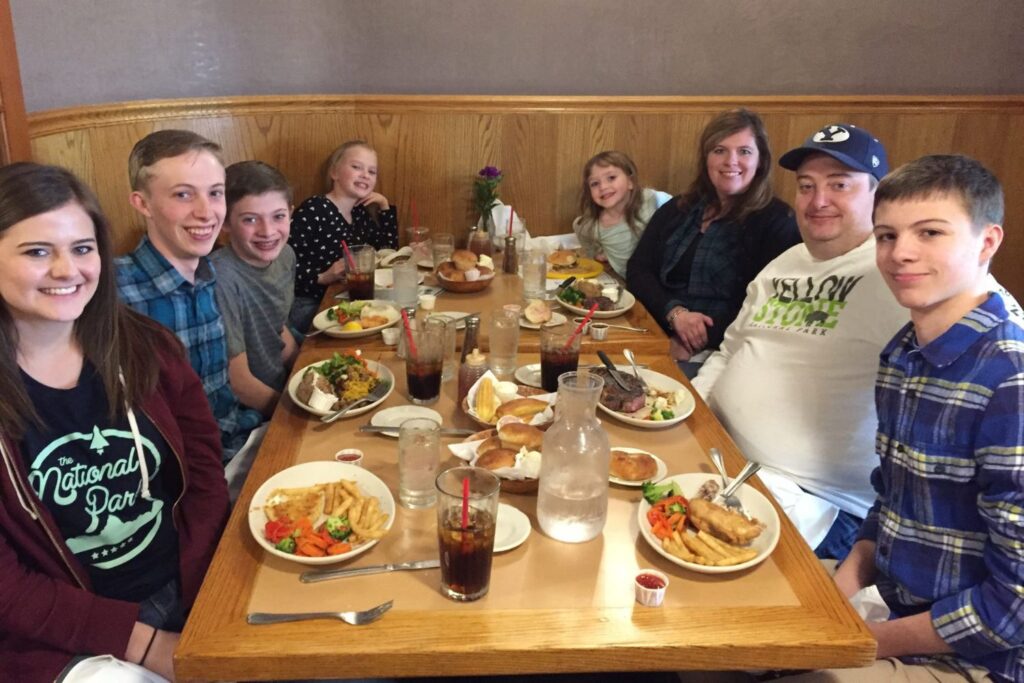In today’s fast-paced world, the Family At The Dinner Table, once a cornerstone of daily life, has transformed many households. Work commitments, school activities, and the omnipresent pull of technology have all contributed to this shift. What was once a daily tradition now faces the challenges of a busy, modern lifestyle. However, the essence of family dinners remains vital as they offer a chance to slow down, reconnect, and foster a sense of belonging amidst the chaos of everyday life.
The Role Of Tradition In Family At The Dinner Table

Tradition plays an integral role in family meals, creating continuity between generations. Rituals surrounding the dinner table, whether it’s the passing of specific recipes or simply gathering at the same time each evening, are powerful symbols of unity. These traditions link to the past, grounding family members in a shared history that provides emotional security and a sense of identity.
The Evolution Of Family Dinners Through Generations
Family dinners have evolved significantly over the decades. In earlier generations, meals were often dictated by strict schedules, with home-cooked food being the norm. Today, the structure of these meals is more fluid, influenced by cultural changes, dietary preferences, and time constraints. Yet, despite these changes, the essence of gathering together remains, even if the format and frequency have shifted.
The Emotional Bonding Power Of Shared Meals
There is an undeniable emotional bond that forms during shared meals. Sitting together, discussing the day’s events, or simply enjoying each other’s company creates an unspoken connection. The act of eating together transcends nourishment; it nourishes relationships, fosters understanding, and builds emotional resilience within families.
Creating Meaningful Conversations Around The Table

The dinner table offers a rare opportunity to engage in meaningful dialogue. It’s a space where distractions are minimized, and conversations can flow naturally. Families who take the time to converse during meals often find that these moments provide deeper insights into each other’s lives. Thought-provoking questions or simple expressions of gratitude can turn an ordinary meal into a time of genuine connection.
Unplugging From Technology To Reconnect With Family
In a world where screens dominate our lives, it is more important than ever to create spaces where technology is absent. Unplugging during family meals lets everyone give each other undivided attention. This conscious effort to be present fosters intimacy, showing that time together is valued and personal connections take priority over digital distractions.
How Family Meals Strengthen Relationships?
Regular family meals strengthen the bonds between individuals. These moments of togetherness serve as a reminder that relationships require time and attention. Families that prioritize shared meals often experience greater closeness, as these dinners become opportunities to build trust, resolve conflicts, and affirm each other’s presence.
The Psychological Benefits Of Eating Together

The psychological benefits of shared meals are vast. Family dinners provide a sense of stability, particularly for children, who thrive on routine. The predictability of regular meals helps alleviate anxiety and offers a safe space for individuals to express their thoughts and feelings. Moreover, eating together reduces feelings of isolation and promotes a sense of belonging, which is critical for mental well-being.
The Dinner Table As A Platform for Teaching Values
The dinner table serves as a quiet stage for imparting values. Whether through direct conversation or the observation of adult behavior, children absorb lessons about respect, gratitude, and responsibility. These mealtime interactions often shape their understanding of how to treat others, reinforcing the importance of kindness, patience, and empathy in everyday life.
Building Trust Through Regular Family Dinners
Trust within a family is not built overnight; it is cultivated through regular, consistent interactions. Family dinners provide the perfect environment for this trust to grow. When children and parents sit down to share a meal, they engage in an unspoken contract of openness. Over time, these moments become the bedrock upon which trust and mutual respect are founded.
How Family At The Dinner Table Foster A Sense Of Belonging?

At its core, a family dinner fosters a profound sense of belonging. Being invited to sit at the table, to share in the food and conversation, signals that each person is a valued member of the group. This feeling of inclusion strengthens family unity and reinforces the notion that the home is a sanctuary where all are welcome and cherished.
Dinner Time Rituals: More Than Just Eating
Mealtime rituals extend far beyond the act of eating. These practices, whether it’s a specific way of setting the table, saying grace, or engaging in a weekly “favorite moments” conversation, add meaning to the experience. These rituals provide continuity and reinforce the rhythm of family life, making meals a special occasion rather than a routine obligation.
The Importance Of Consistency In Family Dinners
Consistency in family dinners creates a predictable rhythm that nurtures family cohesion. While modern life may make daily meals difficult, maintaining a regular schedule—whether it’s a weekly family dinner or a weekend brunch—establishes a routine that family members can look forward to. This consistency signals the importance of family time and strengthens the commitment to being present for one another.
How Family At The Dinner Table Children’s Development?

For children, the impact of family dinners cannot be overstated. Regular mealtime interactions enhance cognitive, emotional, and social development. Studies have shown that children who engage in family meals tend to have better academic performance, improved communication skills, and stronger emotional resilience. These meals are an invaluable opportunity for parents to model positive behaviors and foster their child’s growth in a supportive environment.
Boosting Communication Skills Through Mealtime Conversations
Mealtime conversations provide a natural setting for enhancing communication skills. By participating in discussions, children learn the art of conversation—how to listen, respond thoughtfully, and express their opinions. These interactions help develop confidence and verbal acuity, skills that are essential not only in the home but also in social and academic settings.
Creating A Safe Space For Open Dialogue
Family meals create a safe space where open dialogue can flourish. The relaxed atmosphere encourages family members to share their thoughts and feelings without fear of judgment. This sense of safety allows for deeper conversations, fostering understanding and empathy. Over time, these discussions help build stronger emotional bonds and promote a sense of mutual trust.
Family Meals And Positive Behavior In Children

Meal families play a significant role in shaping positive behavior in children. Sitting together for a meal provides opportunities to reinforce manners, encourage sharing, and model respectful communication. Additionally, the structure and routine of family dinners instill discipline and self-regulation in children, laying the groundwork for responsible behavior both inside and outside the home.
The Role Of Parents In Shaping Family Dinner Dynamics
Parents are the architects of family dinner dynamics. Their approach to mealtime—whether it’s fostering an open and relaxed environment or establishing specific rituals—sets the tone for the entire experience. When parents actively engage, model positive behavior, and encourage participation, they shape the family meal, ensuring it stays a space for connection and growth.
How Family Dinners Reduce Stress And Promote Mental Health?
The benefits of family dinners extend beyond emotional bonding to include mental health. Regular family meals provide a sense of structure that can alleviate stress, offering a time each day to pause and unwind. For children, this predictability offers a sense of security, while for adults, it can be a reprieve from the demands of daily life. Sharing a meal creates a calming atmosphere that promotes relaxation and well-being.
Fostering Emotional Intelligence At The Family At The Dinner Table

The dinner table is a fertile ground for fostering emotional intelligence. Through regular interactions, children learn to recognize and respond to the emotions of others. These moments offer opportunities to practice empathy, patience, and conflict resolution—key components of emotional intelligence that are essential for building strong, healthy relationships both within and beyond the family unit.
Strengthening Family Identity And Culture Through Food
Food is deeply intertwined with identity and culture, and family dinners provide a unique opportunity to celebrate both. Sharing traditional dishes or exploring new culinary experiences together helps strengthen family identity, creating a sense of pride in shared heritage. The meals become a means of passing down cultural traditions, ensuring that the family’s unique story continues to thrive.
The Influence Of Family Dinners on OHealthy Eating Habits
Family dinners have a profound influence on healthy eating habits. When families eat together, they are more likely to prepare balanced, nutritious meals. Children who participate in family dinners also develop healthy eating patterns because their families expose them to a variety of foods and encourage them to make mindful choices. This early exposure lays the foundation for lifelong healthy eating habits.
Teaching Kids About Nutrition During Family At The Dinner Table

Mealtimes present a valuable opportunity to teach children about nutrition. Parents can use these moments to discuss the importance of a balanced diet, the benefits of different food groups, and the impact of food choices on overall health. By involving children in meal preparation and encouraging them to ask questions, parents help foster an understanding of nutrition that will benefit them in the long term.
How Do Family Dinners Encourage Responsibility and Participation?
Family dinners are an excellent way to encourage responsibility and participation. When children take on tasks, such as setting the table, helping prepare the meal, or cleaning up afterward, they learn the importance of contributing to the household. These small acts foster a sense of responsibility and teamwork, reinforcing the idea that each member plays a vital role in the family’s well-being.
Making Family Meals Fun: Engaging Every Member
To keep family meals engaging, it’s important to incorporate fun elements that involve every member. This can be as simple as theme nights, where everyone dresses up or tries out new and exotic recipes together. Engaging activities like these ensure that mealtimes remain enjoyable, encouraging participation and keeping the family excited about coming together at the table.
Reviving The Lost Art Of Cooking Together

Cooking together as a family is a tradition that has faded in many households, but it’s worth reviving. The process of preparing a meal as a team builds camaraderie and teaches valuable life skills. Beyond that, cooking together creates shared memories and fosters an appreciation for the effort that goes into nourishing the family. It’s an experience that brings everyone closer, even before sitting down to eat.
How To Overcome Common Barriers To Family Dinners?
Busy schedules, dietary preferences, and technological distractions are common barriers to family dinners. But they can be overcome with a bit of creativity and planning. Prioritizing at least one shared meal each week, creating a no-phone policy at the table. Accommodating individual preferences can help reestablish family meals as a non-negotiable part of the routine.
Family Dinners In A Busy World: Making Time In A Packed Schedule
In a world where time is a scarce commodity, finding moments for family dinners can be a challenge. However, with planning, these moments can be preserved. Families can simplify meals, use meal prep strategies, or opt for weekend gatherings when schedules allow. The key is not necessarily the frequency, but the quality of time spent together at the table.
The Cultural Significance Of Gathering Family At The Dinner Table

Across cultures, gathering around the table has long been a symbol of community and connection. Whether it’s a holiday feast or a simple weekday meal, the act of coming together to share food carries deep cultural significance. In many societies, it’s seen as an expression of love and respect. A ritual that transcends time and geography to unite people.
Family Dinners And The Power Of Storytelling
Storytelling is an essential part of the family dinner experience. It’s at the dinner table where stories are passed down, personal anecdotes are shared, and family history is kept alive. These narratives not only entertain but also impart lessons, reinforcing values and offering insights into the shared identity of the family.
Why Family Meals Create Lasting Memories?
Family meals etch themselves into memory because they offer more than just an activity—they create an experience. The laughter, the conversations, the rituals all contribute to a sense of nostalgia that lingers long after the meal is over. These moments, seemingly ordinary at the time, become cherished memories that family members carry with them throughout their lives.
YouTube Video
Conclusion
In a world where connection can feel fleeting, the family dinner offers a timeless refuge. It’s a place where traditions are honored, relationships are strengthened, and memories are made. The value of gathering around the dinner table goes far beyond the food served—it’s about the sense of belonging, love, and connection that each meal fosters. Despite the changing dynamics of modern life, the importance of family dinners endures, reminding us of the power of togetherness.


